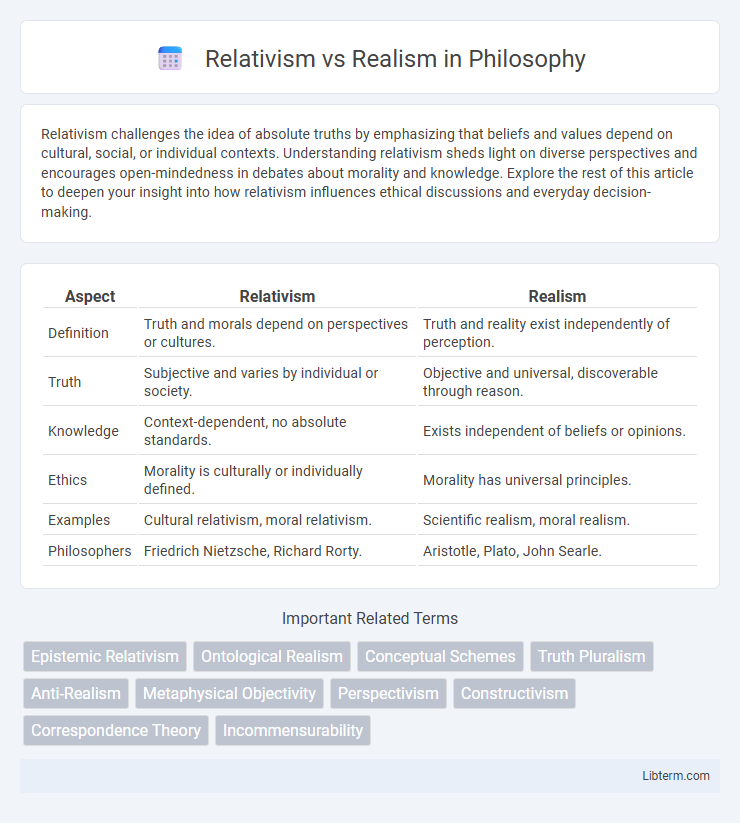Relativism challenges the idea of absolute truths by emphasizing that beliefs and values depend on cultural, social, or individual contexts. Understanding relativism sheds light on diverse perspectives and encourages open-mindedness in debates about morality and knowledge. Explore the rest of this article to deepen your insight into how relativism influences ethical discussions and everyday decision-making.
Table of Comparison
| Aspect | Relativism | Realism |
|---|---|---|
| Definition | Truth and morals depend on perspectives or cultures. | Truth and reality exist independently of perception. |
| Truth | Subjective and varies by individual or society. | Objective and universal, discoverable through reason. |
| Knowledge | Context-dependent, no absolute standards. | Exists independent of beliefs or opinions. |
| Ethics | Morality is culturally or individually defined. | Morality has universal principles. |
| Examples | Cultural relativism, moral relativism. | Scientific realism, moral realism. |
| Philosophers | Friedrich Nietzsche, Richard Rorty. | Aristotle, Plato, John Searle. |
Understanding Relativism: Core Principles
Relativism asserts that truth and moral values are not absolute but depend on cultural, historical, or personal contexts, emphasizing the variability of perspectives across different societies. It challenges the notion of universal truths by promoting the idea that knowledge and ethics are constructed through social frameworks. This core principle highlights the significance of understanding diverse viewpoints to grasp the fluid nature of reality and morality.
Key Concepts of Realism Explained
Realism asserts that reality exists independently of human perception, emphasizing an objective world governed by natural laws and facts. It maintains that truth is discoverable through observation, rational analysis, and empirical evidence, emphasizing the mind-independent existence of entities. Key concepts include the belief in an external reality, objective knowledge, and the idea that facts remain true regardless of individual beliefs or cultural perspectives.
Historical Background: Relativism vs Realism
The philosophical debate between relativism and realism traces its origins to ancient Greek philosophy, where Plato advocated for an objective reality independent of perception, laying the foundation for realism. Contrarily, sophists like Protagoras introduced early relativist ideas, arguing that truth is subjective and varies with individual perspectives. This historical tension evolved through medieval scholasticism and Enlightenment thought, shaping modern epistemology and metaphysics by contrasting absolute truths with context-dependent knowledge.
Major Philosophers and Their Perspectives
Major philosophers addressing relativism versus realism include Plato, who advocated for realism through his theory of ideal forms, positing that abstract entities exist independently of human perception. Friedrich Nietzsche challenged objective realism by promoting perspectivism, a form of relativism asserting that knowledge is always influenced by individual perspectives and cultural contexts. Immanuel Kant offered a critical synthesis, arguing that while reality exists independently, human understanding is mediated through innate cognitive structures, blending elements of both realism and relativism.
Moral Implications: Ethics in Relativism and Realism
Moral implications in relativism emphasize the variability of ethical standards based on cultural, social, or individual perspectives, leading to tolerance but potential ethical ambiguity. Realism asserts that objective moral truths exist independently of human opinion, providing a stable foundation for judgment and accountability. This fundamental difference impacts debates in human rights, justice, and ethical decision-making across diverse societies.
Relativism vs Realism in Science and Knowledge
Relativism in science argues that knowledge and truth are shaped by cultural, social, or historical contexts, suggesting scientific theories are valid only within specific paradigms. Realism maintains that scientific theories aim to describe an objective reality independent of human perception or social constructs. The debate between relativism and realism in knowledge challenges the universality and objectivity of scientific facts versus their contextual and interpretive nature.
Cultural Impact: Societal Views and Debates
Relativism emphasizes that cultural beliefs and moral values are context-dependent, leading societies to embrace diverse practices without universal judgment, thereby fostering tolerance and multiculturalism. Realism asserts the existence of objective truths and universal standards, often sparking debates about cultural relativism versus human rights and ethical norms. These competing perspectives shape societal discussions on governance, law, education, and intercultural interactions, influencing policies that balance respect for cultural diversity with adherence to global ethical principles.
Strengths and Weaknesses of Relativism
Relativism emphasizes the importance of cultural and individual perspectives, allowing for a flexible understanding of truth that accommodates diversity and context. Its strength lies in promoting tolerance and open-mindedness by rejecting absolute or universal standards. However, relativism faces the weakness of potentially leading to moral ambiguity and logical contradictions, as it may undermine the possibility of objective judgment or shared values.
Strengths and Weaknesses of Realism
Realism emphasizes the existence of an objective reality independent of human perception, providing a robust framework for scientific inquiry and empirical verification. Its strength lies in promoting consistency and predictability in understanding the natural world, while its weakness includes challenges in addressing subjective experiences and cultural diversity that relativism highlights. Critics argue realism may oversimplify complex social phenomena by ignoring contextual variations and interpretive nuances.
Practical Applications and Contemporary Relevance
Relativism emphasizes that truth and moral values are context-dependent, influencing cultural sensitivity in international relations and ethical decision-making in pluralistic societies. Realism asserts objective truths and universal principles, shaping legal frameworks, scientific inquiry, and policy-making by grounding actions in empirical evidence and stable norms. Contemporary debates in philosophy and social sciences often apply these perspectives to address issues such as human rights, climate change policy, and global governance.
Relativism Infographic

 libterm.com
libterm.com